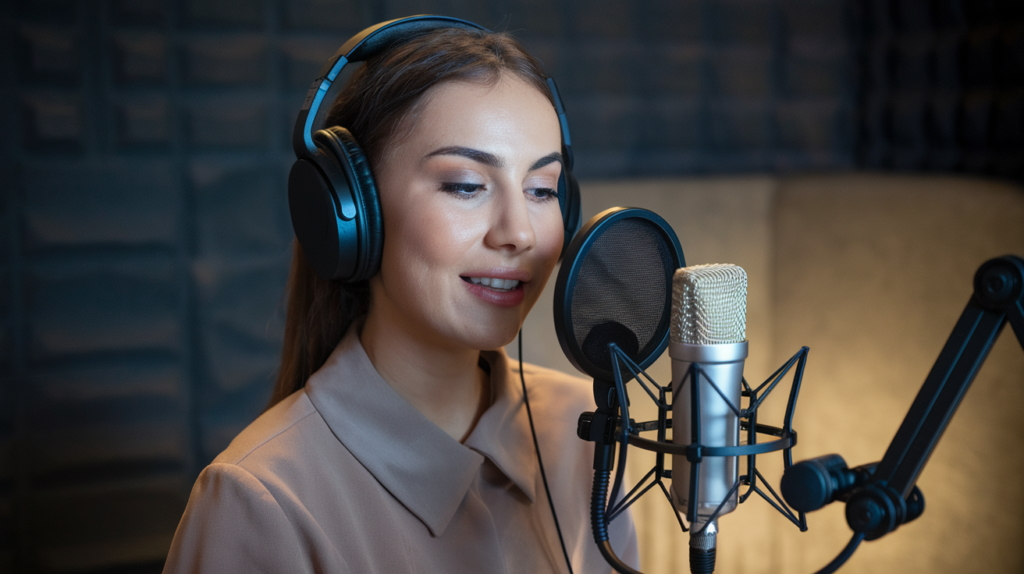When it comes to voiceovers, the nuances of language can make all the difference. Bulgarian and Macedonian voiceovers may seem similar at first glance, but they each carry unique characteristics that set them apart. Understanding these differences is crucial whether you’re a content creator looking to reach a specific audience or simply curious about the rich linguistic landscape of Southeast Europe.
In this article, you’ll dive into the distinct features of Bulgarian and Macedonian voiceovers. From accent variations to cultural context, you’ll discover how these elements influence tone and delivery. Get ready to explore how choosing the right voiceover can enhance your project’s impact and resonate with your target demographic.
Key Takeaways
- Distinct Vocal Characteristics: Bulgarian voiceovers typically showcase a rich tonal quality influenced by Slavic roots, while Macedonian voiceovers feature a softer, more melodic delivery style.
- Cultural Context Matters: The cultural backgrounds of Bulgarian and Macedonian voice artists significantly impact their performance styles, affecting emotional resonance and engagement with audiences.
- Accent Variations Influence Delivery: Accent differences between the two languages create unique rhythms and pacing in voiceover work, making it essential to choose talent that aligns with your target demographic.
- Application in Media: Understanding how each language is used in film, television, and commercials can guide content creators to select the right voice talent for effective audience connection.
- Importance of Voice Acting Talent: Skilled voice actors from both regions bring valuable qualities; Bulgarian artists excel in vocal projection while Macedonian performers are noted for their emotive delivery.
- Training Opportunities Available: Both Bulgaria and North Macedonia offer specialized training programs for aspiring voice actors, enhancing skills crucial for effective performances across various media formats.
Overview of Voiceover Industry
The voiceover industry plays a critical role in various sectors, including advertising, entertainment, and education. Understanding the nuances of this field enhances project effectiveness and audience engagement.
Voiceovers involve using distinct vocal characteristics to convey messages across different media formats. These include commercials, animations, audiobooks, and e-learning modules. The demand for skilled voice talent continues to grow as businesses seek to connect with diverse audiences.
In Bulgaria and North Macedonia, the voiceover landscape reflects rich cultural heritages. Bulgarian voice artists often showcase a unique tonal quality that resonates well with regional audiences. Macedonian voice actors similarly bring their own cultural flair into projects, making it essential for content creators to choose suitable voice over talent based on their target demographic.
Accent variations significantly impact delivery styles in both languages. For instance, while Bulgarian accents may exhibit softer tones, Macedonian accents might present sharper intonations. These subtleties affect not just pronunciation but also emotional resonance within the content.
Moreover, understanding local cultural contexts allows you to select appropriate voice over actors who can effectively convey your message and align with audience expectations. Collaborating with experienced professionals ensures that your project benefits from authenticity while appealing to specific market segments.
Exploring trends within the industry reveals an increasing integration of technology in delivering services like remote recordings or AI-generated voices. However, human touch remains irreplaceable in creating compelling narratives through authentic performances by talented voice artists.
As you navigate the complexities of selecting the right type of voiceovers for your projects, consider evaluating samples from various regions and dialects. This approach helps identify which qualities resonate best with your intended audience while enhancing overall project appeal.
Key Differences Between Bulgarian and Macedonian Voiceovers
Understanding the key differences between Bulgarian and Macedonian voiceovers enhances your ability to select the right voice talent for your projects. Both languages share similarities, yet their unique characteristics significantly impact delivery and audience engagement.
Language and Dialect Variations
Bulgarian voiceovers often feature a distinct tonal quality influenced by its Slavic roots. The language employs complex grammatical structures that can affect rhythm and pacing in voiceover work. In contrast, Macedonian presents a softer intonation with influences from neighboring languages, resulting in a more melodic delivery style. These dialect variations lead to different emotional resonances within content, making it crucial to choose the appropriate voice artist based on the target audience’s preferences.
Cultural Influences on Voiceovers
Cultural context plays a vital role in shaping voiceovers in both Bulgaria and North Macedonia. Bulgarian voice actors typically draw from a rich history of literature and folklore, infusing their performances with depth and authenticity. This cultural background informs their approach to character portrayal and narrative tone. Conversely, Macedonian voice artists may incorporate elements from diverse cultural traditions, reflecting regional storytelling practices that resonate with local audiences.
When selecting voice over talent for your project, consider how these cultural nuances influence tone, emotion, and overall effectiveness of the message you’re conveying. Understanding these differences enables you to align your choice of voices with the expectations of specific demographics or markets.
Popular Usage in Media
Understanding the popular usage of Bulgarian and Macedonian voiceovers in media provides valuable insights for selecting the right voice talent for your projects. Each language has distinct applications that resonate with specific audiences.
Film and Television
In film and television, voiceovers play a crucial role in character development and storytelling. Bulgarian voice actors often bring a rich tonal quality influenced by their Slavic heritage, enhancing dramatic moments or comedic scenes. Their ability to convey deep emotions through varied intonations appeals to both local and international viewers. Conversely, Macedonian voice artists deliver a softer, more melodic style that captures attention and connects with audiences on an emotional level. This unique delivery can elevate narratives in dramas or animated films, making them engaging.
Commercials and Advertisements
Commercials heavily rely on effective voiceovers to communicate brand messages succinctly. In Bulgaria, voice over talent typically adopts persuasive tones that align with marketing strategies focused on reliability and tradition. This approach resonates well within local markets where trust is paramount. On the other hand, Macedonian voiceover actors often utilize charming vocal styles that evoke warmth and friendliness, appealing especially to younger demographics. By understanding these differences in tone and delivery, you can select the ideal voice artist who aligns with your campaign goals while resonating with target audiences effectively.
Voice Acting Talent
Voice acting talent plays a fundamental role in the effectiveness of voiceovers. Understanding the nuances between Bulgarian and Macedonian voice actors helps you select the right fit for your project.
Notable Voice Actors
Both Bulgarian and Macedonian voice actors possess unique skills that enhance their respective industries. Bulgarian voice artists often demonstrate strong vocal projection and clarity, which make them suitable for various media formats, from commercials to documentaries. Macedonian voice actors stand out with their emotive delivery and melodic tones, allowing them to connect more deeply with audiences. Exploring portfolios showcases distinct styles; this enables you to identify specific talents that align with your project’s needs.
Training and Education Opportunities
Training opportunities for aspiring voice over talent are abundant in both countries. In Bulgaria, several institutions offer specialized courses focusing on vocal techniques, diction, and performance skills tailored for various media applications. Similarly, North Macedonia provides workshops led by experienced professionals, emphasizing creative expression through voice work. Engaging in these educational programs sharpens skills essential for becoming a successful voice artist, ensuring you’re equipped to select the most qualified candidates for your projects.
Conclusion
Understanding the nuances between Bulgarian and Macedonian voiceovers is crucial for any content creator. By recognizing their unique tonal qualities and cultural contexts, you can make informed decisions that resonate with your target audience.
Whether you’re focusing on advertising or entertainment, selecting the right voice talent enhances emotional connection and engagement. Each language brings its own flair that can significantly impact how your message is received.
As you navigate this vibrant landscape, keep in mind the importance of authenticity in voiceovers. The right choice not only elevates your project but also honors the rich cultural heritages of both Bulgaria and North Macedonia. Embrace these differences to ensure your content stands out in today’s competitive market.
Frequently Asked Questions
What are the main differences between Bulgarian and Macedonian voiceovers?
Bulgarian voiceovers typically feature a distinct tonal quality influenced by Slavic roots, while Macedonian voiceovers often present a softer, more melodic delivery style. These differences affect how emotions are conveyed and can significantly impact audience engagement.
Why is cultural context important in voiceover selection?
Understanding local cultural contexts helps ensure that the chosen voice talent aligns with audience expectations. This authenticity enhances the overall effectiveness of the message, making it resonate better with specific demographics.
How do accent variations influence delivery styles in voiceovers?
Accent variations play a crucial role in tone and emotional resonance. Bulgarian accents may project strength and clarity, whereas Macedonian accents often convey warmth and friendliness, affecting how audiences perceive the content.
What trends are shaping the voiceover industry today?
Current trends include integrating technology for remote recordings and using AI-generated voices. However, human touch remains irreplaceable for creating compelling narratives that connect emotionally with audiences.
Are there training opportunities for aspiring voice artists in Bulgaria and North Macedonia?
Yes, Bulgaria offers specialized courses focused on vocal techniques, while North Macedonia provides workshops led by experienced professionals. Engaging in these programs is essential for developing skills necessary to succeed in the industry.






